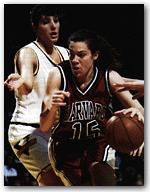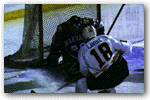Main Menu · Search · Current Issue · Contact · Archives · Centennial · Letters to the Editor · FAQs
![]()
Main Menu ·
Search · Current Issue · Contact · Archives · Centennial · Letters to the Editor · FAQs
![]()
| A Dean's Half Decade | Disunion, Continued |
| Harvard Portrait | Dreams Deferred |
| Front-Door Policy | Kroks Around the Clock |
| The Undergraduate | People in the News |
| Sports | The University |

![]()
For the first time in history, the Harvard women's basketball team reached the NCAA tournament. (The men's team last made it in 1946.) As the #14 seed in the Mideast Region, Harvard played #3 seed Vanderbilt on the Commodores' home court in Nashville, Tennessee. Ultimately, Vanderbilt prevailed, 100-83, but it was a difficult win; Harvard twice drew within five points during the game's final minutes. Crimson coach Kathy Delaney-Smith described the contest as "the most exciting athletic event I've ever been a part of," adding, "I have never been so proud to be associated with Harvard and this team as I was after that game."
Her pride was well justified. Facing a team making its ninth tournament appearance in 10 years, the Crimson, with superb outside shooting, nonetheless led Vanderbilt 41-40 at the half. Harvard sank 16 of 30 three-point attempts, setting a tournament record. Guard Amy Reinhard '96, one of four players in double figures, threw in all 15 of her points from outside the circle. And although Vanderbilt had three six-foot athletes in its forecourt, it out-rebounded Harvard by only 45-37.
The NCAA appearance capped a stellar season (20-7 overall, 13-1 Ivy), which ended on a 13-game winning streak, a school record. Harvard defeated every Ivy opponent except Yale at least once by 20 or more points, and defeated Yale twice by smaller margins. Cornell was the only Ivy school able to gain a win-by a 70-69 score-over the Crimson.
Sophomore Allison Feaster, the Ivy League Player of the Year and a unanimous First Team All-Ivy selection, was an individual star at forward. Cocaptain Elizabeth Proudfit '96 joined her as a First Team All-Ivy, and Jessica Gelman '98 was a Second Team choice.
The men's basketball team (15-11 overall, 7-7 Ivy) finished over .500 for the first time since 1984-85. Led by strong defense, the hoopsters took fourth place in the Ivy League, and at one point reeled off a seven-game winning streak. Forward Kyle Snowden '97 led the attack with 15.1 points and 11.1 rebounds per game. The latter figure was tops in the Ivy League and among the top 10 in the nation. Sen-ior Mike Gilmore finished his career as Harvard's all-time leader in three-pointers converted, having sunk 167 from the cheap seats.
The men's swimming team had one of its best seasons ever, going 12-1 in dual meets (where only top 10-ranked Florida beat the Crimson, 127-115). Harvard posted a 9-0 record in the EISL. The aquamen took the Eastern Championship for the fourth time in five years, outswimming defending champion Princeton and nine other schools.
Eight Harvard swimmers qualified for the NCAA championships, the largest number ever. (Last year, three aquamen swam in the NCAAs.) One qualifier, Brian Younger '98, an All-American in the 500 and 1650 freestyle last season, won two events (1000 and 1650 freestyle) at the Eastern Championships. Younger came fourth in the 1500 meter freestyle at the U.S. Olympic trials. Another NCAA qualifier, Eric Matuszak '98, who set four school records at the Easterns, qualified for six different NCAA medley, freestyle, and relay events.
 The men's hockey team ended a difficult season (13-20-1 overall, 9-12-1 ECAC) on a high note. After a year that saw several players sidelined by a mid-season auto accident, and ended with a dismal nine-game losing streak, Harvard rose to the occasion in the ECAC tournament, skating for the title against Cornell. The Big Red pulled out a 2-1 victory for the championship, but Harvard's run to the final electrified thousands of fans.
The men's hockey team ended a difficult season (13-20-1 overall, 9-12-1 ECAC) on a high note. After a year that saw several players sidelined by a mid-season auto accident, and ended with a dismal nine-game losing streak, Harvard rose to the occasion in the ECAC tournament, skating for the title against Cornell. The Big Red pulled out a 2-1 victory for the championship, but Harvard's run to the final electrified thousands of fans.
The Crimson resurgence began in the ECAC quarterfinals against St. Lawrence, which had finished third in the league, three notches above Harvard. But in the opening game, Harvard blew open a 2-2 tie with three goals in the final period for a 5-2 win. The Saints took the next game, 3-2, setting up the high-scoring showdown. The first puck hit the net a mere 36 seconds into the rubber game, giving Harvard a 1-0 lead on their way to an 8-4 triumph and a trip to Lake Placid for the semifinal.
There, the Crimson faced #1 seed Vermont, which boasted the league's best goaltender and the nation's highest-scoring forward line. Yet Harvard stunned the crowd, upsetting Vermont, 4-3, in a game featuring a tightly played third period that saw only nine shots-six by Harvard, one of which was the gamewinner.
In the championship game against Cornell, the Crimson again struck early, scoring in the first minute of play. But Cornell won with two goals of its own, both of which, oddly, bounced off Harvard players en route to the net.
The season was the last one for goalie Tripp Tracy '96, who became the third Harvard netminder to rack up 2,000 career saves. Late in the season, sophomore center Henry Higdon went on a scoring streak for 16 goals in his final 17 games. It was not enough to save a snakebit campaign, but the icemen gave themselves a finale to remember.
Pity the poor Amherst men's squash team: undefeated entering their final match of the season, played on their home courts against Harvard. What a time to find out what real competition is like-and to end up whitewashed, 9-0. But they had plenty of company; that was the typical score this year. Only Princeton squads were able to win as many as three games against the Crimson men's (15-0) and women's (13-0) squash powerhouses. In his four years as head coach, Bill Doyle has led these teams to a combined 109-1 record, including 79-0 in the regular season and 44-0 in the Ivy League. At this point, an opposing coach's worst nightmare must be Doyle clearing his throat and vowing, "OK, no more Mr. Nice Guy."
Main Menu ·
Search · Current Issue · Contact · Archives · Centennial · Letters to the Editor · FAQs
![]()